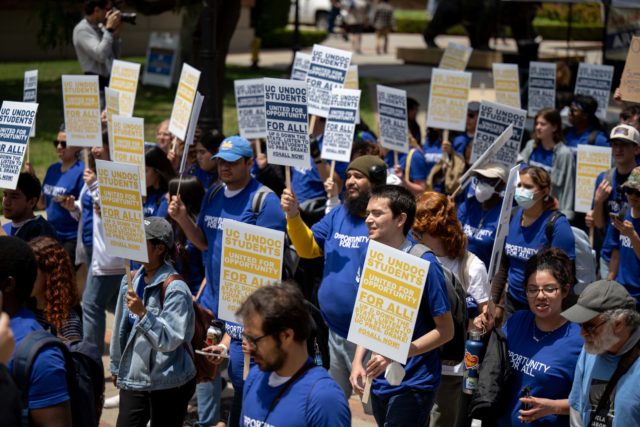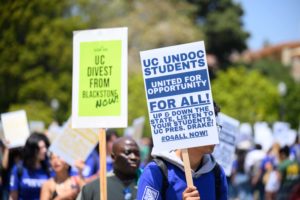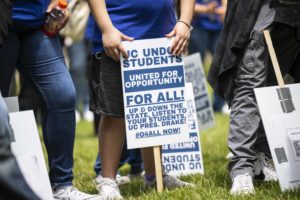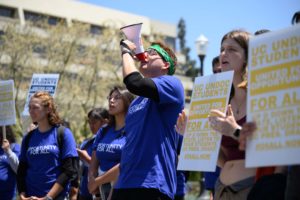This post was updated Oct. 15 at 5:29 p.m.
An appeals court judge denied a request to order the UC to hire undocumented students.
Jeffry Umaña Muñoz and Iliana Perez filed a lawsuit against the University on Oct. 1, requesting an order for the UC to revoke its policy banning undocumented students from on-campus employment. The California Court of Appeals in the First District denied the petition for the order Friday before evaluating the merit of the claims made, said Hayley Burgess, senior communications strategist for UCLA’s Center for Immigration Law and Policy, in a press release.
[Related: UC faces lawsuit regarding refusal to hire undocumented students to on-campus jobs]
Burgess added in the press release that attorneys for Umana Muñoz and Perez will seek a review of this decision with the California Supreme Court.
“The California Court of Appeals denies more than 95% of writs that come before it, without deciding on them on the merits of the claims,” Burgess said in the press release. “This just means that the court thinks we should file our lawsuit in a different forum.”
In a statement emailed to the Daily Bruin on Oct. 1, UC Office of the President spokesperson Omar Rodriguez said the University had not yet received the lawsuit and would respond appropriately when it did. When asked again for comment Monday, Rodriguez said the University had nothing else to add to its original statement.
In the lawsuit, attorneys supported the legal framework suggested by the “Opportunity for All” movement, which argues that the 1986 Immigration Reform and Control Act – a law making it “unlawful for a person or other entity to hire, recruit, or refer a fee” to any undocumented immigrant – does not apply to state entities, including the UC.
Ahilan Arulanantham, a researcher of this legal framework, said he believes the IRCA does not apply to the UC because the Supreme Court has declared that the word “person” does not encompass states. He added that, in 1996, Congress amended IRCA to specify that the word “entity” refers to any branch of the federal, rather than state, government.
Arulanantham also said the United States Supreme Court has stated that, generally, congressional statutes do not apply to states unless specific verbiage is used. He added that Congress must explicitly use the word “state” or “a state and its political subdivisions” in the text of the bill for it to apply on a state level.
Finally, many federal laws that impact employment – including the Americans with Disabilities Act, the Rehabilitation Act and the Family Medical Leave Act – explicitly say the law applies to states, Arulanantham said. However, IRCA has no comparable provision, he added.
“People have assumed it applies to states,” he said. “It’s wrong on the text of what the law says, and it’s wrong when you compare it to other laws, and it’s wrong when you look at this doctrine about how clearly Congress has to state that it governs.”
Arulanantham, faculty co-director of UCLA’s CILP, said attorneys for the petitioners filed the case in a Court of Appeals because they believed the lawsuit met certain criteria mandated by the state to appear in an appellate court.
One of these criteria is that there is no dispute about the facts of the case, he added. This benchmark has been met, he said, as the Petitioners and the University agree that undocumented students across the UC cannot currently hold campus jobs.
“Facts are for trial courts – they hear evidence and can have witnesses take the stand,” he said. “If it can be mostly done on paper, that’s one reason.”
An additional reason a lawsuit may be filed in an appellate court is if the matter needs to be dealt with quickly, he said. With prospective UC undocumented students looking ahead to the University’s Nov. 30 admissions application deadline, Arulanantham added that he believes it is urgent that the court makes a swift decision.
“We know there’s a lot of students who are looking at that Nov. 30 deadline,” he said. “They’re trying to decide, ‘Am I going to be able to work as a graduate worker, a PhD student who’s teaching undergrads?’”
Diego Castro, a UC Irvine alumnus, said he applied and was accepted to UC Merced to pursue his doctoral degree in education with a full scholarship. Castro, who came to the U.S. from El Salvador at age 10, added that the university rescinded its offer because he could not provide work authorization.
UC Merced then offered Castro a one-year scholarship, with no funding for the next four years of his doctoral studies, he said, making it unaffordable.
Castro was then accepted to a master’s in education program at UCLA, which he accepted and is currently pursuing. However, he said this program will not allow him to reach his ultimate goal of becoming a professor in the United States.
“My dream has always been to work at a university,” Castro said. “It’s very hard to negotiate that and have a positive outlook, when realistically I know that I’m going to have a master’s and not be able to use this.”
He added that, throughout his experience as an undocumented undergraduate student, his professors and teaching assistants helped make his experience more positive.
“It’s always been professors or students or other professionals in higher education who have made my not-so-positive experience in college be positive,” Castro said. “I can’t really do anything or support other students who may be experiencing other issues, like me being low income or being first generation – I’m far from doing that.”
The lawsuit came after Governor Newsom vetoed a bill in September that would allow undocumented students to hold on-campus jobs, and the UC Board of Regents rejected a similar plan in January.
Both Newsom and the Regents claimed that accepting said plans could have put them in violation of IRCA. In Newsom’s veto message, he said a federal judge should address the bill’s legality before proceeding.
[Related: Newsom vetoes bill that would allow undocumented students to hold campus jobs]
Arulanantham said that the lawsuit hopes to serve as another pathway for undocumented students to access employment following these prior rejections. He added that, if the court sides with the Opportunity for All movement, a federal ruling would say that IRCA does not apply to state entities, granting states the autonomy to choose whether to allow undocumented immigrants to work.
“For states that want to keep doing what they’re doing now and not employing any undocumented people, that’s fine under our theory,” Arulanantham said. “For those states that want to be more inclusive, that option would be open to them.”
Castro said he joined the lawsuit as a declarant to bring awareness to what he perceives as unequal opportunity following Newsom’s veto. Coming from a low-income background, he added that he was unable to receive a full education as an undergraduate, as his friends studied abroad, worked in research and pursued other paid academic opportunities.
“I just want to be able to come to school without thinking about where my next meal is going to come,” Castro said. “I would want to be able to be a graduate student and be a full graduate student and not think about all the other implications.”





Comments are closed.